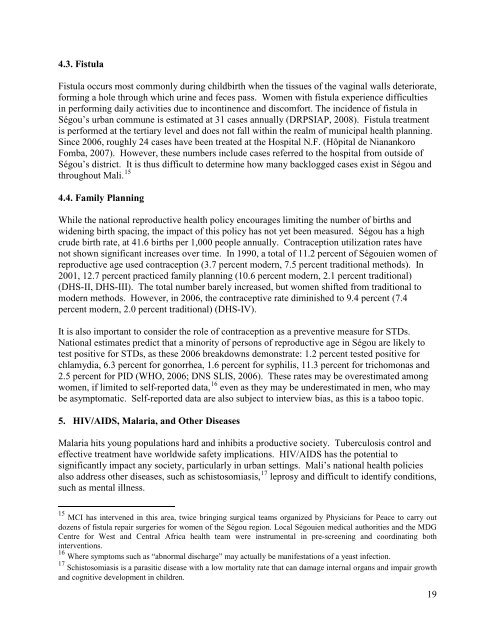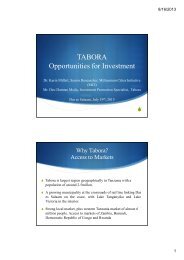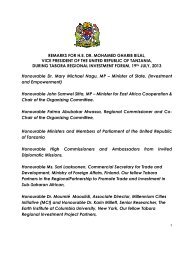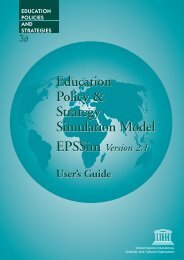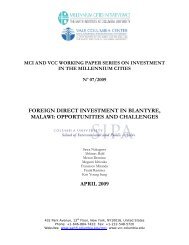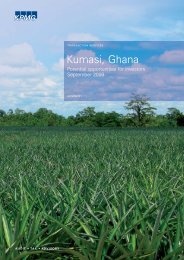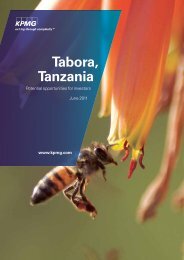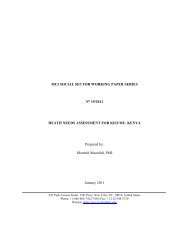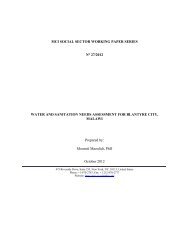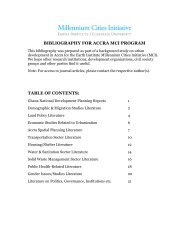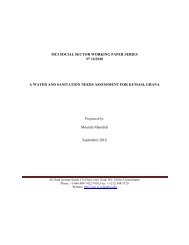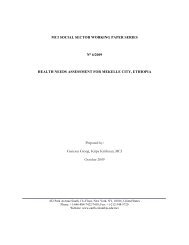Health Needs Assessment for the City of Segou, Mali - Millennium ...
Health Needs Assessment for the City of Segou, Mali - Millennium ...
Health Needs Assessment for the City of Segou, Mali - Millennium ...
You also want an ePaper? Increase the reach of your titles
YUMPU automatically turns print PDFs into web optimized ePapers that Google loves.
4.3. Fistula<br />
Fistula occurs most commonly during childbirth when <strong>the</strong> tissues <strong>of</strong> <strong>the</strong> vaginal walls deteriorate,<br />
<strong>for</strong>ming a hole through which urine and feces pass. Women with fistula experience difficulties<br />
in per<strong>for</strong>ming daily activities due to incontinence and discom<strong>for</strong>t. The incidence <strong>of</strong> fistula in<br />
Ségou’s urban commune is estimated at 31 cases annually (DRPSIAP, 2008). Fistula treatment<br />
is per<strong>for</strong>med at <strong>the</strong> tertiary level and does not fall within <strong>the</strong> realm <strong>of</strong> municipal health planning.<br />
Since 2006, roughly 24 cases have been treated at <strong>the</strong> Hospital N.F. (Hôpital de Nianankoro<br />
Fomba, 2007). However, <strong>the</strong>se numbers include cases referred to <strong>the</strong> hospital from outside <strong>of</strong><br />
Ségou’s district. It is thus difficult to determine how many backlogged cases exist in Ségou and<br />
throughout <strong>Mali</strong>. 15<br />
4.4. Family Planning<br />
While <strong>the</strong> national reproductive health policy encourages limiting <strong>the</strong> number <strong>of</strong> births and<br />
widening birth spacing, <strong>the</strong> impact <strong>of</strong> this policy has not yet been measured. Ségou has a high<br />
crude birth rate, at 41.6 births per 1,000 people annually. Contraception utilization rates have<br />
not shown significant increases over time. In 1990, a total <strong>of</strong> 11.2 percent <strong>of</strong> Ségouien women <strong>of</strong><br />
reproductive age used contraception (3.7 percent modern, 7.5 percent traditional methods). In<br />
2001, 12.7 percent practiced family planning (10.6 percent modern, 2.1 percent traditional)<br />
(DHS-II, DHS-III). The total number barely increased, but women shifted from traditional to<br />
modern methods. However, in 2006, <strong>the</strong> contraceptive rate diminished to 9.4 percent (7.4<br />
percent modern, 2.0 percent traditional) (DHS-IV).<br />
It is also important to consider <strong>the</strong> role <strong>of</strong> contraception as a preventive measure <strong>for</strong> STDs.<br />
National estimates predict that a minority <strong>of</strong> persons <strong>of</strong> reproductive age in Ségou are likely to<br />
test positive <strong>for</strong> STDs, as <strong>the</strong>se 2006 breakdowns demonstrate: 1.2 percent tested positive <strong>for</strong><br />
chlamydia, 6.3 percent <strong>for</strong> gonorrhea, 1.6 percent <strong>for</strong> syphilis, 11.3 percent <strong>for</strong> trichomonas and<br />
2.5 percent <strong>for</strong> PID (WHO, 2006; DNS SLIS, 2006). These rates may be overestimated among<br />
women, if limited to self-reported data, 16<br />
even as <strong>the</strong>y may be underestimated in men, who may<br />
be asymptomatic. Self-reported data are also subject to interview bias, as this is a taboo topic.<br />
5. HIV/AIDS, Malaria, and O<strong>the</strong>r Diseases<br />
Malaria hits young populations hard and inhibits a productive society. Tuberculosis control and<br />
effective treatment have worldwide safety implications. HIV/AIDS has <strong>the</strong> potential to<br />
significantly impact any society, particularly in urban settings. <strong>Mali</strong>’s national health policies<br />
also address o<strong>the</strong>r diseases, such as schistosomiasis, 17<br />
leprosy and difficult to identify conditions,<br />
such as mental illness.<br />
15 MCI has intervened in this area, twice bringing surgical teams organized by Physicians <strong>for</strong> Peace to carry out<br />
dozens <strong>of</strong> fistula repair surgeries <strong>for</strong> women <strong>of</strong> <strong>the</strong> Ségou region. Local Ségouien medical authorities and <strong>the</strong> MDG<br />
Centre <strong>for</strong> West and Central Africa health team were instrumental in pre-screening and coordinating both<br />
interventions.<br />
16<br />
Where symptoms such as “abnormal discharge” may actually be manifestations <strong>of</strong> a yeast infection.<br />
17<br />
Schistosomiasis is a parasitic disease with a low mortality rate that can damage internal organs and impair growth<br />
and cognitive development in children.<br />
19


